The urgency of our planet's health
In a world experiencing rapid environmental shifts due to factors like climate change and dwindling natural resources, our planet's well-being has never been more critical.
Amidst these challenges, your organization has the power to effect positive change, both big and small, that can significantly impact the environment, your organization and society.
By investing in sustainable strategies, you can accelerate progress towards a more sustainable future, benefiting everyone.
In this article we explore what they are, and how you can implement them within your organization.
The route to net zero
Climate change is threatening the stability of the environment, with global warming bringing surface temperatures to 1°C above pre-industrial levels. Organizations can help combat climate change and achieve stability by committing to net zero emissions by 2050.
The positive impact of a net zero commitment is two-fold: the environmental impact can be accompanied by a positive commercial impact, too. We serve as a reliable partner, assisting organizations in making informed decisions about their investments in achieving net-zero status.
A prominent illustration of this is The ISO Net Zero Guidelines, a product of the collaborative effort known as Our 2050 World. This comprehensive framework caters to organizations at various starting points on the journey to net zero.
The impact of sustainable infrastructure
Sustainable infrastructure encompasses a broader range of elements, including the built environment, digital infrastructure, and utilities. It's important to acknowledge that our impact on the planet goes beyond the physical world and includes the systems and structures we rely on daily.
Opting for sustainable infrastructure investment can bring substantial benefits to your organization, especially financial institutions with significant sway over the broader economy.
Transitioning to a circular economy
Transitioning to a circular economy involves redefining the ways we design, manufacture, reuse and recycle materials. Whether it’s by considering reusing resources, materials or repurposing waste, your organization can help to break the cycle of dependency on raw and new materials.
The quantity of waste produced every year in Europe alone amounts to 2.5 billion tonnes that needs to be disposed of safely. This current waste model is damaging to the environment, and one that is not sustainable for the planet’s resources.
Our guidance (BS 8001) equips organizations with a practical framework for the implementation of actions that lead towards a circular economy, enabling them to contribute to reducing their business's environmental footprint.
However, organizations transitioning to a circular economy can be at risk of greenwashing. Research found as many as 42% of green claims were exaggerated, which can make it difficult for the public to trust organizations. As such it is important for organizations to build consumer trust in their circular model and accurately and confidently communicate the quality of their products.
An effective method to earn, establish, and maintain consumer trust is through the utilization of the BSI Kitemark scheme. In a survey, 95% of consumers expressed a higher inclination to purchase products bearing the BSI Kitemark.
Furthermore, a novel initiative enables consumers to acquire Kitemarked reconditioned items, potentially preventing them from ending up in landfills. This advancement contributes to the ongoing efforts in tackling Europe's waste issue.
A sustainable future
With carefully chosen commitments to the planet and expert guidance from our trusted solutions, organizations can turn their sustainability ambition into action.
A more sustainable future can be achieved through collaboration, and through sharing knowledge and expertise. When organizations know better, they can do better. By working with us as your trusted partner, we help to accelerate positive change and drive progress towards a more sustainable future.








